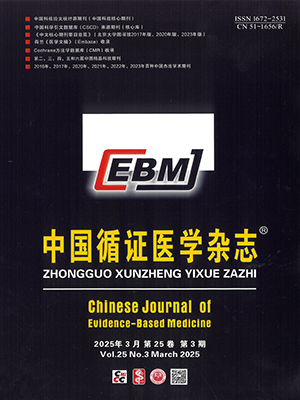Objective To evaluate the effectiveness and safety of intraluminal brachytherapy (ILBT) in prolonging survival and the period free of symptoms for patients with unresectable bile duct cancer.
Methods We searched MEDLINE (1977 to May 2007), CNKI (1979 to May 2007) and CBM Disk (1979 to May 2007). The qual ity of included studies was assessed according to the guidance in the Cochrane Handbook for Systematic Reviews of Interventions.
Results One randomized controlled trial involving 42 patients with unresectable bile duct cancer fulfilled the inclusion criteria. This found that the median survival time was longer for patients treated with endoprostheses and ILBT compared to those treated with endoprostheses alone (387.9 days versus 298.0 days, P lt;0.05). The stent patency time in patients who were treated with endoprostheses and ILBT was longer than for those treated with endoprostheses alone (378.4 days versus 245.5 days, P lt;0.01). The reductions in bil irubin (mol/l) and alkal ine phosphatase (kat/l) before and after drainage in patients who were treated with endoprostheses and ILBT were similar to those treated with endoprostheses alone (Mean ±SD of bil irubin: before: 219.3 ± 40.5, after: 23.1 ± 37.1 versus before: 227.3 ± 39.8, after: 22.5 ± 44.2; Mean ± SD of alkal ine phosphatase: before: 10.3 ± 5.1. after: 3.6 ± 2.9 versus before: 11.7 ± 5.8, after: 3.7 ± 2.9). No severe adverse effects were observed in the trial.
Conclusion Current evidence suggests that ILBT for unresectable bile duct cancer may improve the survival time of patients, prolong the time they spend symptom free, improve their quality of l ife and reduce the burden of treatment. However, it may increase toxicity in normal tissues, which can be managed by adjusting radiation dosage. No serious adverse effects were observed in the 42 patients in the trial in this review. More randomized controlled trials with large sample size are needed to provide rel iable results.
Citation: HUANG Xin,WU Taixiang. System Evaluation of Intraluminal Brachytherapy (ILBT) Combined with Endoprostheses Comparied with Endoprostheses alone for Nonresectable Bile Duct Cancer. Chinese Journal of Evidence-Based Medicine, 2009, 09(2): 239-242. doi: 10.7507/1672-2531.20090046 Copy
Copyright © the editorial department of Chinese Journal of Evidence-Based Medicine of West China Medical Publisher. All rights reserved




